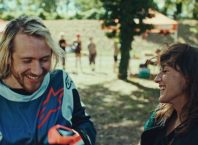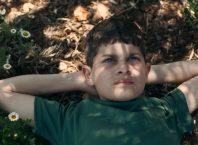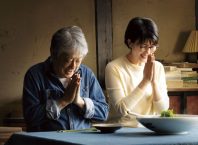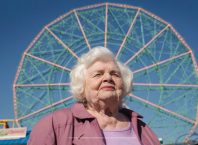Feeling good often feels like too much of a reach these days, but there’s a lot to feel good about at TLVFEST 2024. The very existence of the festival, and the ability of festival Founder and Director Yair Hochner to put together a festival in these difficult times, and with an outstanding program of films – cheers me up immensely. The full program and ticket information are available on the TLVFEST website.
There’s a lot to recommend, but here’s a start, with an emphasis on feeling good.
Chuck Chuck Baby
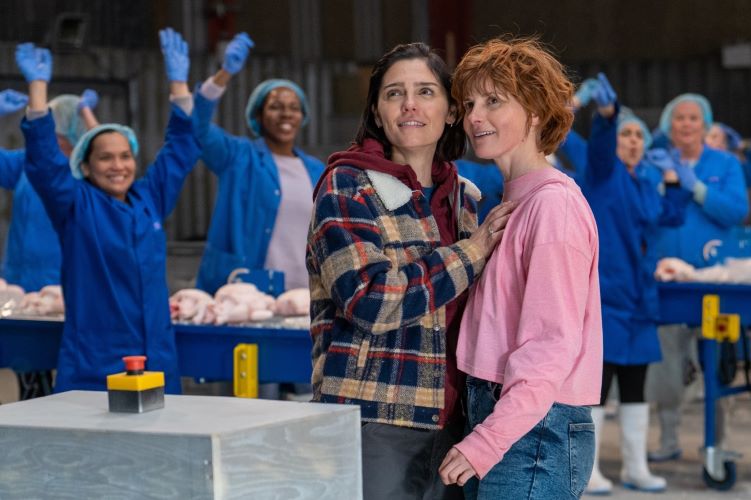
A feel-good movie that will sing its way into your heart, Chuck Chuck Baby is a healing balm for anyone who has ever felt stuck in a bad situation, thinking that there’s no way out. Written and directed by Janis Pugh in her feature debut, the film’s protagonist Helen (a terrific Louise Brealey) is trapped and miserable, so much so that doing the night shift at the chicken factory where she works is like a mini vacation from her terrible home life. She lives with her boor of a husband Gary (Celyn Jones), his girlfriend Amy (Emily Fairn) and their baby. Helen also cares for Gary’s elderly mother Gwen (Sorcha Cusak), but that is a labor of love, as Gwen has been like a mother to Helen, taking her in, when at age 16, the institution where she lived was shut down. The industrial North Wales town where she lives doesn’t have much to offer, and chances of escape are effectively nil for an unskilled worker, especially when Gary forces Helen to give him half her wages.
How, you might ask, can this ever be a feel-good movie? You get a glimmer as Helen, on her way to work, sings through her tears, along with Neil Diamond on the radio: “I am I cried/I am said I…” She’s not a great singer, but despite that, or perhaps because it’s not a virtuoso performance, she conveys the inner strength and spirit, the great heart that Helen possesses. A heart that is just waiting for a great love.
Enter Joanne (Annabel Scholey), back in town after her father’s death to deal with packing up his apartment. Standing in her plaid shirt by her blue convertible, just outside the chicken factory, she’s the very image of the coolest lesbian in the world.
Super sentimental, I know. Romantic, dramatic, funny and whimsical – this the movie for all those people, me included, for whom life events – momentous and miniscule – are connected to songs. Not a typical musical, the film relies on songs throughout to convey its themes, and it’s a great soundtrack, including Lesley Duncan’s Love Song, Minnie Riperton’s Les Fleurs, Goin’ Out of My Head by Little Anthony & the Imperials, and more.
Fragments of a Life Loved
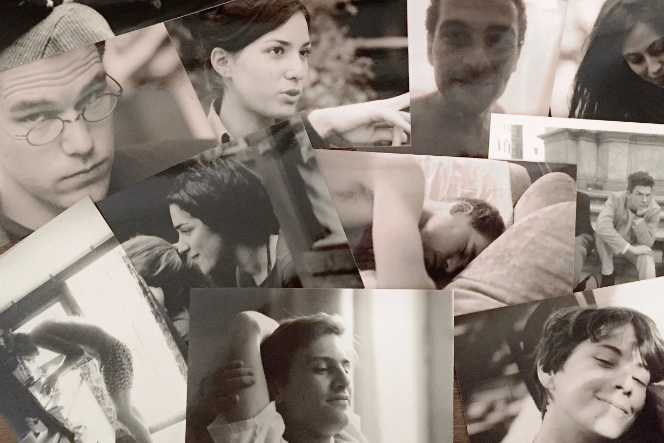
Would you want the world to see you through the eyes of your ex? For most of us, that would be the worst nightmare imaginable. Chloé Barreau has turned it into a captivating documentary. Fragments of a Life Loved is an unusual exploration of relationships, sexuality, identity and memory.
Director Chloé Barreau has meticulously documented her life and relationships on camera since age 16. In creating this film, she took the unusual step of inviting her former lovers to take part, however, they are all interviewed by a third, neutral, party, an unseen interlocutor. Reflecting on the general nature of relationships, breakups, and their fallout, it’s astonishing that the 12 people interviewed for the film agreed to participate. As one of the interviewees, Rebecca, says, “It’s crazy she feels entitled to ask us. However, once she asked, it was impossible to say no.”
Through the stories of these 8 women and 4 men, one forms an image of Barreau, as an intense, sensual, cerebral, powerful, and yet in some ways contradictory, and ultimately, an enigmatic figure, an eternal seeker. The speakers reflect on Barreau and their relationships with her, speaking freely of their thoughts and feelings. Through their words, one becomes acquainted with their characters as /pwell, some more than others, yet they are undeniably an incredibly attractive and intelligent group, the kind of people you would enjoy meeting at a party. Interspersed with archival video, the film is a palimpsest of past and present, with vivid scenes of Paris and Rome contributing to the sensual atmosphere. Meticulously edited, the film has the surging energy of a spirited conversation, open, honest, and utterly fascinating.
Out
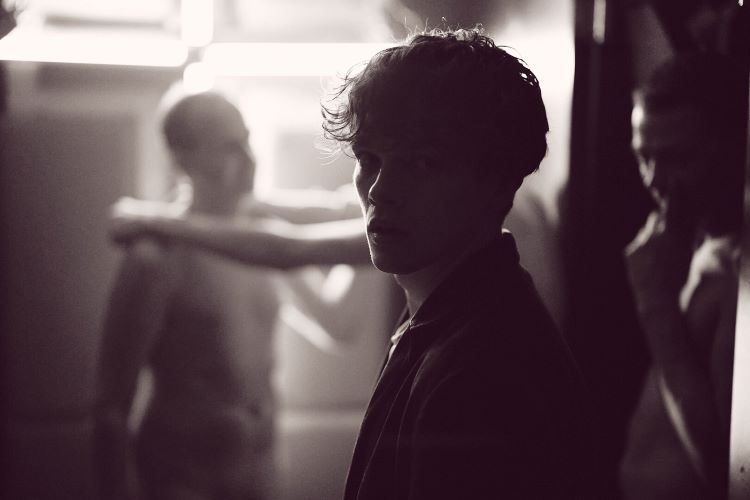
Tom (Bas Keizer) feels like an outsider in the small, conservative village in the Netherlands where he lives. Passionate about filmmaking, he and his best friend and secret lover Ajani (Jefferson Yaw Frempong-Manson) hope to be accepted to film school, their way out. Directed by Dennis Alink and filmed in luscious black and white by Thomas van der Gronde, Out captures the restlessness of youth yearning to be free of the narrow-minded restraints of their families and town, to be out on their own, experiencing a wider world of opportunities and sensations, and the often-surprising impact of that encounter with a more open, urban, culture.
The composition of each frame in this film is precise, an integral part of the storytelling in which the simplest moments become beautiful. The film opens on a close-up of Tom, sitting at a large table, poking at his food. In the background one can see a hazy, partial image of Ajani and his mother as he cooks an omelette. Tom is surrounded by people and conversation at the table, but they remain beyond the frame. Tom is alone with his tensions. Joining the others at the table, Ajani comes out to his family, who accept him with warmth, saying, “We don’t care what the neighbors say.” A statement that provokes a challenging reaction from Tom. Tom sets all his hopes on moving to Amsterdam, telling Ajani, “Once we’re in Amsterdam it’s going to be different.”
Their wishes come true, and there’s a great montage set to Arthur Lee’s Everybody’s Gotta Live, as they joyfully begin their new life. Every social system has its rules, and in Amsterdam the two lovers find themselves immersed in two different systems at once: film school and the urban gay scene. The two youths are very different in temperament, as is clear from the start, and Tom and Ajani each respond to the new environment in different and perhaps surprising ways. Alink’s film is a striking, honest, and visually compelling exploration of friendship, art, sexuality, and identity, a riveting and thought-provoking film.
Summer Qamp
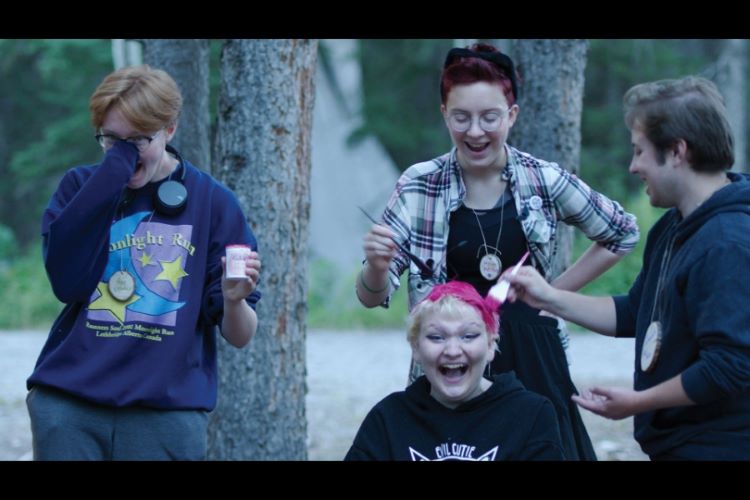
Summer Qamp, directed by Jen Markowitz, is a documentary everyone in the world should see. The film focuses on teenagers attending Camp fYrefly in Alberta, Canada, a leadership program and safe space for LGBTQ+ youth. The young people featured in the film are amazing, so self-aware, mature, and articulate. Listening to them discuss complex issues of identity and sexuality, recount their experiences with bullying or isolation, it is apparent that their wisdom and confidence has been hard-won. Like every other summer camp, fYrefly offers arts and crafts, nature walks, and gathering around the bonfire at night. As the camp artist in residence Marshall says, “our job is to get them to be kids again.”
For some, coming from rural areas, it’s an opportunity to meet other LGBTQ+ youth, and as one teen said, “I’m so excited to be surrounded by people who I don’t have to explain myself to.” It’s also a place to find mentors, people who can hear their questions and even if they don’t have “the answer,” will listen with understanding and compassion.
Each individual story is fascinating, and I felt my heart exploding with admiration for these bright, vivacious, courageous young people, and wishing that all LGBTQ+ teenagers could experience the love, support, and freedom that the camp offers. Summer Qamp is 80 minutes of Queer Joy!


